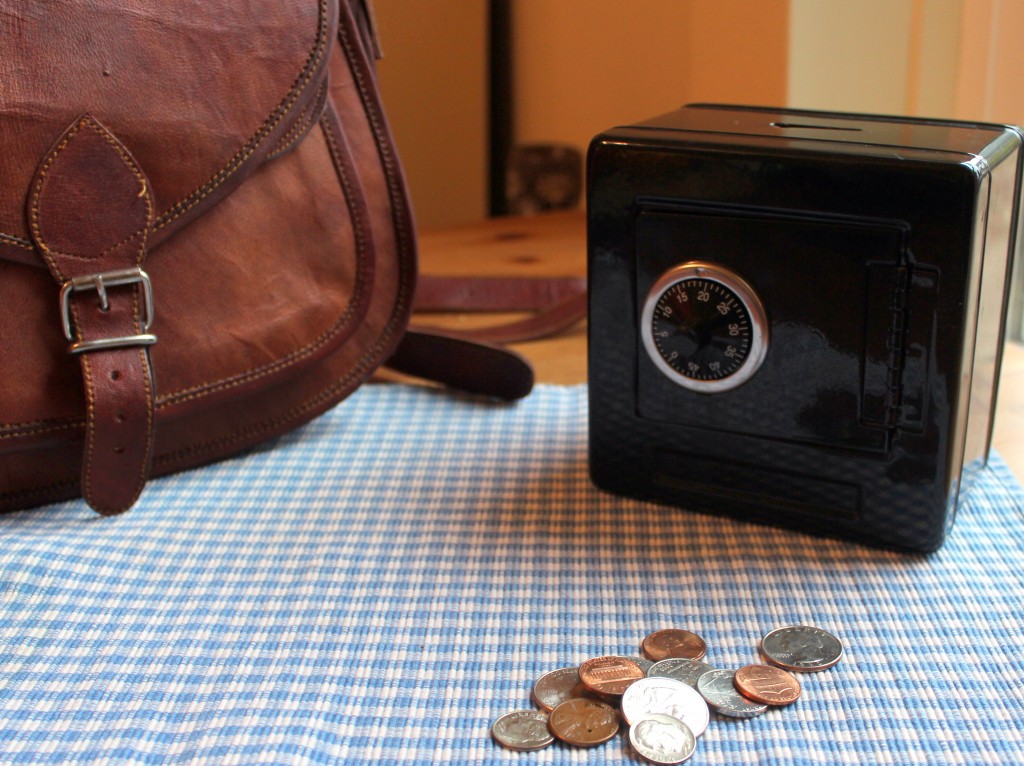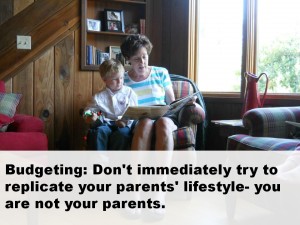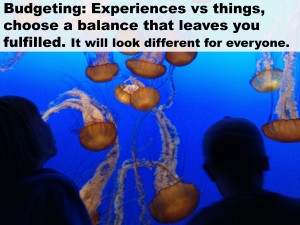 Being a budgeting expert isn’t necessary. Being intentional with your money is. Having a good grasp on what you can and cannot afford is. Being able to cover most minor emergencies (ie car repairs) without relying on debt is a pipe dream of most Americans who live paycheck to paycheck.
Being a budgeting expert isn’t necessary. Being intentional with your money is. Having a good grasp on what you can and cannot afford is. Being able to cover most minor emergencies (ie car repairs) without relying on debt is a pipe dream of most Americans who live paycheck to paycheck.
Being able to slip into ‘no spending mode’ when you’re almost in reach of a savings goal, without feeling like you’re missing out on the joys of life unlocks a lifetime of financial gain and contentment.
Taking responsibility for your financial choices, owning mistakes, and taking responsibility for things you’re responsible for… even if they’re not technically your fault… is another way to empower yourself financially.
I understand everyone is different and this isn’t going to work for everyone, I only have my own personal set of circumstances that I’ve worked through for sure. But as I’ve learned from those around me who are better with money than I am, financial smartness is just a change in plans, and provides an unbelievable peace of mind.
This Making Room For Healthy Changes post is the start of a series of posts to help you make room in your time, budget, and more importantly cluttered mind, to make the healthy changes that you’ve been meaning to make.
Your goals will vary- they can be anything as daunting as doing the GAPS Intro or as simple as using a few more natural remedies and finding a source of local grassfed beef.
How We Budget is part of this series because when the money runs out before the next payday, the stress is consuming. It’s time consuming to be broke, and if we can adjust our thinking or our spending, that should help.
Update 2021:
I’ve talked about budgeting from time to time, which I used to do strictly with envelopes, then a debit card, and this past year I’ve switched to rewards credit cards and the YNAB software.
YNAB software acts like envelopes while still working with credit cards. It essentially ‘takes away’ your money as soon as you’ve spent it and applies it to the credit card payment well before it’s due. This keeps us from accidentally spending more than we intended! It’s really awesome software, and is my preference over others (I’ve tried quicken, mint, and everydollar).
My credit card strategy so far has been to apply for a credit card that gives a spend bonus if I think I can meet the bonus. For me that means all groceries, car maintenance, etc. goes on this card. I’ve been surprised at how, with YNAB budgeting, this works out super well!
The cards I’ve liked so far:
- Chase Sapphire Rewards
- Capital One Venture (mostly for travel)
I had been credit card free for over a decade, so I wanted to give this a solid 6 months before I told you about it. I can say that this former Dave-Ramseyer is now a convert! I haven’t carried a balance at all and I auto-draft my statements in full each month. And I benefit from the bonus!
*For the bonuses, make sure you read the fine print and set a reminder on your phone to check them 30 days before the spending period ends! The above cards do have fees, but if you can meet the bonus, you will make quite a bit more in cash ( apply it back to your spending, or use for travel!) than the fees.
I was hemming and hawing about rewards cards for a long time, but they turned out to be great for us, helping to cover the travel we’re doing with sports as the kids get older.
Your Income Needs to be More than Your Expenses
The reason people fall into debt, or don’t have enough money to cover their expenses, is that their expenses exceed their income. I know, this is super obvious, but it’s still the truth. For the rest of this article I am going to really just be looking at how people get to the point where their expenses exceed their income and some ways that I am able to keep expenses down. I keep my budget in an excel spread sheet. I use a debit card now, and I’ll go through and add up any iffy categories (food still can get me if I don’t pay attention) every couple weeks, but overall I’m used to staying in my budget.
When I first started budgeting, I used the envelope system described below. I adjust my excel sheet whenever something new is coming up- anything from paying to preschool to having an income drop to changing where I live. I don’t use any high tech budgeting programs, a simple column of income and expenses and savings works fine for me.
Make Your Spending Estimate Realistic
No, Really, You Need to Look Again
Something I see often when I’m talking to people who are having trouble saving is that they estimate way down on purchases they feel guilty about making, or they know deep down is not the right decision. Hitting fast food isn’t ‘like $5’ for most people, especially if they have children, it’s closer to $13-20. Going out to eat, because you’re too tired to cook, to a steak joint isn’t ‘like $20’, the bill for two usually comes to over $60. Unless you are very carefully couponing and eating very low cost staples, even for a couple or small family, groceries and household products are not going to be ‘something like $200/month’.
Yes, there are exceptions. If you consistently predict your grocery cost within the dollar before you get rung up, you are not who I am talking to. 
Medical is a big one too- going to the walk-in clinic if you are uninsured or have a deductible is hundreds to thousands of dollars. Surgery, even outpatient, is thousands and thousands of dollars.
Medical is expensive, yes, I have a variety of opinions on the subject of how it should/could be, but that still doesn’t change the fact that it is expensive and necessary. Generic medications can be cheaper, but sometimes a name brand is needed, and those are lots of money. Using holistic medicine is often less expensive, but not always.
Making a decision to seek alternative care needs to be done carefully in most families. This is what drove me to the GAPS diet rather than visiting a naturopath. Yes, eating on GAPS is expensive, but for only one child, one visit to the naturopath plus a lab test plus a holistic remedy or two can buy you a LOT of GAPS-legal food.
Medical expenses for families, even those who seek alternate treatments, are chronically under-budgeted. 
You Are Not Your Parents
I think we all fall in this trap. Depending on where you live, what a ‘good income’ for your parents was and the income you need to replicate that same quality of life 20-30+ years later, are very different salaries! In my case, I chose to have children early(23 for my first) where I was born when my mom was 10 years older than that and had already had an established career, had built up equity through home ownership, and had been saving and purchasing home furnishings for years.
I would have my children at the same time in a heartbeat, I absolutely love being a mom, and that’s what I knew I wanted to do from the time I got married, but I can’t use my parents’ budgeting decisions as my own. Just because something was a certain way when I was growing up, doesn’t mean I can or want to make the same choices for my children. For us, that means if we want to buy a house, it needs to be in a different part of the country. Housing prices in Northern California are a lot different from prices in other parts of the country.
Other choices that we might need to make that are different from our parents are our decision to drive new vs used cars, our decisions to save for retirement rather than having a pension, and having catastrophic vs low deductible/low co-payment medical insurance through work. 
Be Flexible and Put Off Purchases
I’m a planner, and often I have to make many revisions to my plans because things don’t work out how I thought they would.
It might be something as simple as bowling Thursday nights, if the $10 weekly fee is straining my tight budget, I might need to give it up. I might need to invite friends over for drinks at home rather than going out, or do a small family birthday party rather than renting the kids’ gym or other popular birthday party place.
For me flexibility means choosing what makes the biggest difference to me. I don’t mind driving a 12-year old car, and allocating a good chunk of money to save for car repairs. I don’t mind living in a not-so-awesome part of town right now, but I know when I buy, I’ll want to live in a better part of town. I do choose to spend money on experiences like visiting the aquarium with my kids. I buy them fewer items of clothing, but I like it to be higher quality so I don’t have to re-buy again in a couple months.
This is going to look different for everyone, the important thing to do is to realize you cannot have it all, and to spend money where it really makes a difference to you and your family, ignoring what everyone else thinks and does.
Putting off purchases of things I think I ‘need’ became a habit when my children were small and we had a very tight budget. Even now that the budget isn’t so tight, I’ll put off purchases- I’ve been using a broiler instead of a toaster for years. I don’t have a stand mixer (I’ll buy more kitchen stuff when I own a house and stop moving so much, I’m almost there). I own like 4 pots/pans. Each of us has a set of summer and a set of winter sheets and that’s it. My kids slept in toddler beds until they were 4 and 6 and I found a set of awesome bunkbeds on Craigslist after Christmas.
All of these purchases aren’t that big of a deal, and it’s not really a question of whether I can afford them or not, it’s just a habit of not buying things all the time. By putting off purchases I often can find a great deal (if I saw a nice toaster oven at the scratch and dent store marked way down, I’d snap that up!), have time to shop around for one with good reviews, and get over the habit of impulsively purchasing what I think I ‘need’ based on what other people have.
More Money is Not the Only Solution
When there is trouble with balancing the income vs outflow in a family or personal budget, it seems like there are usually two camps. The first we are going to look at is those who think that more money will solve all their problems. Often the thinking for young parents is that once the daycare/preschool bills stop and mom can go back to work, their problems will be over.
This may be true if their budget is only short by a couple hundred dollars a month, but it’s not always the case. Examine your outflow of cash carefully, usually the extra spending is a result of being in denial about what the financial realities are. If you are in the habit of spending more money than you can afford to, having more money usually will not fix this problem.
The Two Income Trap (available at many libraries) details how relying on a two incomes can actually trap a family, and how many families are better off keeping mom home with the kids rather than trying to get her employed full time as soon as the youngest starts kindergarten.
Cutting Costs isn’t the Only Solution either
The second camp tends to think that cutting expenses is always the solution to money problems. Sometimes families do have an income crisis.
There are only so many expenses that can be cut, and when all the focus is on cutting expenses, the ability to earn more is often overlooked. In this economy we need to be creative with how we earn money. The ideal of dad working a 9-5 job and being able to provide everything a family needs might not be feasible for most families.
I was talking to a friend the other day and she said something profound to me- I’m so used to thinking that dad can provide all we need working one 40-hour a week job (that’s how I was raised). She said, “Are you kidding? My dad made a good living, but he drove long haul trucks- he was on the road 10 out of 14 days! My brother always had 2 jobs, and once my mom was a single mom, she owned a diner and worked 10 hours a day or more, 6 days a week. The 9-5 job with weekends off isn’t realistic for many families”
Use Cash and Envelopes
Unless you have quite a bit of room for error, or you can calculate your grocery total to within the dollar, cash and envelope, ‘the envelope system’ is the best way to train yourself to stay on budget and to stay within a tight budget. Watch the video below, I explain how we use the envelope system and what it does for our family.
- Pull out cash for the month or pay period and put in envelope categories that work for you.
- When the money runs out, you have to stop spending.
- If you make bulk food purchases, such as ordering coconut oil or 1/4 of a beef, put a little money in another ‘cow’ or ‘coconut oil’ envelope each month from what you allocate for ‘groceries’, or have an item in your budget that stays in your checking or savings account for bulk purchases.
- For gas, keep a credit or debit card in your glove compartment. This keeps you from being tempted to swipe it if you bring more than you have budgeted for up to the register, but it’s still there for gas at the pump. I don’t pay for my gas in cash because I am not going to unload everyone from the car just to pay.
- Only bring the envelopes with you that you’re going to use. Keep longer term or occasional use envelopes like ‘clothes’ or ‘furniture’ in the desk.
Craigslist is My Friend
I have expensive tastes. My dad is a fine woodworker, and my mom has home decor that could be featured in a magazine. I haven’t gotten into the home decor much, but I do appreciate solidly built furniture, and good quality kitchen equipment.
When I shop on Craigslist, I make it an entire weekend activity. I have a set amount of cash to spend, and I don’t plan on haggling. I choose to look in a nice area of town (Scottsdale and Gilbert in Arizona, Marin and Napa in California) and plan on driving a bit to get my furniture. My couches, chair, dining room table, bedroom set, and the kids’ bunk beds all came from Craigslist.
The people who are selling high quality furniture often list it on Craigslist inexpensively and price it to move because they are ready to get it out of their house *now* and don’t mind losing some money on it. They appreciate clear communication (I usually email and offer my phone number in the email) and prompt arrival. I don’t haggle with them, I got a great deal paying full price for all my furniture. I look up brand names before I decide to go see the pieces, and I only go if they have clear pictures.
I’m really happy with this- all my furniture cost less than it would from Target or Big Lots or some other discount furniture store, and it’s made to last. It might not be the newest style, but I really don’t care about style, I care about quality.
Have a Budget Buddy
“If your broke friends think you’re doing it wrong, you’re on the right track” Dave Ramsey. I have a friend that I respect for their financial decisions who can go over major financial choices with me. I don’t ask for financial advice from people who have different goals than I do, and I don’t ask for financial advice from someone who reads the finance section of the paper every day, but is also living paycheck to paycheck.
Talking about finances is taboo in our society (believe me, I’m plenty nervous about publishing this post!), but being transparent with a friend who you respect and can point you in the right direction goes a long way in creating a plan that works, and not being swayed by every financial article or news clip you come across.
Insurance is not a Substitute for Planning Ahead
I use insurance to protect myself against catastropic mistakes or catastrophic accidents. I choose to ‘self insure’ for anything that wouldn’t cause a major change in our lives. As you have more wiggle room in your budget and have built up more savings, you will rely on insurance less.
Health insurance- I choose catastrophic insurance, and we treat at home for everything we can, and budget to make routine visits an expected expense. How high of a deductible you can take will depend on your specific family.
Car insurance – at this point, it would impact my life quite a bit if my car was totaled, so I do have comprehensive coverage. I live in a state where there are quite a few uninsured people, so I choose to have the extra uninsured motorist coverage. I can, though, take the highest deductible they offer, since the difference between the deductibles is low and I really don’t anticipate having my car totaled every year.
Rental Insurance- this doesn’t cover everything, but if our rental was broken into or caught on fire, it would provide some money to purchase necessities like beds, clothing, and kitchen equipment again. This wouldn’t cover what we lost 100%, but I don’t need that, I just need to not be furniture and clothes-less in case of an emergency.
Postal insurance and ‘extended warranties’- Would it severely impact your month financially if the $30 sweater you mail to Aunt Suzie gets lost in the mail? No? Then I’d skip the optional $2.50 insurance on those Christmas gifts. Do you need the extended warranty on the vacuum you just purchased? How likely is it to break? How much would it impact you if you had to buy a new one in 6 months? Is it an option to buy it at Costco or some other store who offers awesome warranties anyway? What about pay for it with a credit card that automatically doubles the warranties (read that fine print in those credit card info packets!)?
Keep A Sense of Humor
I love what Dave Ramsey calls Stupid Tax. I didn’t plan ahead and got a $35 fee for going through the FastTrac lane on the Golden Gate Bridge? That’s stupid tax.
I co-signed on a loan and then had to pay it off when the person defaulted, again, stupid tax. I didn’t pack water and had to buy bottled water at a convenience store while we were out? Stupid tax.
Noticing what you could have planned ahead for and saved money, and then laughing about it (sometimes after crying about it for a while), is much more productive than expecting things will always go right or being in denial. It’s fantastic to give people the benefit of the doubt, yourself included, but it’s also important to learn from your mistakes and stop making them. Don’t beat yourself up- it’s not a reflection on yourself as a person- but admitting mistakes does help us from making the same ones in the future.
Investing
Personally, I’m still working on my 6-month emergency fund and buying a home, so I haven’t started investing for retirement. I have accounts for my kids for when they turn 18 (for them to use for college, or for a down payment for a house, or for a business start up- I don’t think college is an automatic necessity for every 18 year old, but that’s a whole other post).
When I do have the ability to start investing, I will have a mix of stocks (which I don’t understand yet and need to research) and rental properties. I chose not to invest at all until I knew I was covered for emergencies- for me that meant 3 months of expenses (not the same as 3 months of income) in the bank. At that point I did start contributing monthly to modest savings accounts for my children because they are getting older quickly, and I know how tough it is to get ahead when you’re just starting out.
Budget Expectations
I hope that helps give you some insight into how to get your money to work for you. If you’re brand new to budgeting, I recommend watching Dave Ramsey on Hulu and poking around the free stuff on his website. I don’t follow everything he says word-for-word, but I do like the basics and find that when I follow his advice, my finances run smoothly.
I like budgeting because, for the most part, it is something I can keep control over. If you asked me 10 years ago if this is what my budget would look like, I honestly would have had no idea that I would spend this much on housing or food. I find it helpful to be aware of my expenses, and the totals of them, so I can shape my expectations for myself to be more realistic.
If you have any questions, I’ll try to answer in the comments, but again, I’m not an expert- just a mom who can pay for a fuel pump to be replaced on her car without having a nervous breakdown :)
Learn how to heal leaky gut

60-page ebook of all my best GAPS Diet (Gut and Psychology Syndrome) articles all in one place.





Great post on living within your means. It’s definitely a tough thing and I think a lot of people don’t like to admit that they too are trying to “keep up with the Jonses.” It’s also tough when inflation has risen faster than most wages have. Annnd it’s also tough when we have a government that sets an example that debt is no big deal…
It is, but the numbers still don’t lie so we can plan and adjust. There are more opportunities out there as well- I make my income from this blog, it would have been difficult to support my family working from home 20 years ago :)
Well done! I will print this for my children to read.
I’m so glad you like it! :) This area is tough, Cheri!
Love this article! Agree with everything you say. We’ve lived on my husband’s income since we’ve been married. It’s always been tight, but we budgeted his income BEFORE we were married. He had to prove to me he could provide for us! We have three boys and homeschool. We have 4 months emergency, college fund going for about 8 years now (still not a huge amount, but SOMETHING!), saving for retirement (but not the 15% he advises, just 6% right now) and only about 7 years left till we pay the house off!
Retirement savings is hard- I’m hoping that by paying off my house, I can downgrade to a smaller paid for house and my costs of livings will be much lower in retirement. I’m going to start contributing once I have a good portion of my house (that I haven’t bought yet!) paid off :)
Love the post…have been a budgeter since our first child was born when i was 25. I have been considering ways to earn money writing from home because our family needs more income but with 4 kids I can’t seem to make even a part-time job work for us. What is a good resource that helped you get your blog started and earning income from it? Thanks in advance!
Hi Meeri, it took me a couple years of blogging before I was able to make an income from it, and I just put together a course helping other start. Soon I hope to have a full class – but for now I have a free email series. http://www.healthhomeandhappiness.com/how-to-start-a-blog
Just curious — do you include paper products and other non-food items in your regular grocery budget? I’m getting into the habit of using the cash system for weekly groceries, but man does it suck up my money when I suddenly seem to need things like dish soap, toilet paper, detergent, etc. all in the same week! Do you buy these things at the store or online?
I buy them mostly on Amazon now, I’ll link to the post below. When I bought them at the store I had a separate ‘household’ envelope, it does add up! I took out my grocery money weekly, but I did take out my household money all at the beginning of the month. http://www.healthhomeandhappiness.com/2013/06/using-amazon-to-save-time-and-money.html
I love this post, Cara. Very clear, practical and actionable advice.
Thanks Jenny! I appreciate you stopping by :)
Cara,
The post is very well written, I think its something I needed as a reminder. One of your older posts led me to Dave Ramsey a year ago and I went to his classes and started budgeting..but I think there was still some denial somewhere which I need to address… Thanks for all your help…you have made quite a difference in quite a few of our lives..
Regards
Sireesha
A great budgeting system is the software You Need A Budget (ynab.com). It helped me see what I needed to save for.
finally started using personal finance software the beginning of 2013. I was shocked to see that we are spending an average of $1375 a month on groceries for a family of three! Add dining out and treats to that, and it’s even more. We do some expensive things, like order from Three Stone Hearth once a month and shop at The Fatted Calf and Prather Ranch for meat, instead of buying bulk. We are about to invest in a freezer, so that should help. But, wow! We mostly shop at Rainbow and the farmer’s market, and buy Kerry Gold butter and wild frozen salmon at Trader Joe’s.
KerryAnn Foster who blogs at Intentionally Domestic says her monthly bill is $200 to $500 a month. See article:
http://www.intentionallydomestic.com/get-real-dont-go-into-debt-for-food/#more-3658
While this may not be realistic in San Francisco, some commenters on the post linked above said they spend less than $1000 a month for a family of three, in the bay area. My family is on a tight income, and could seriously use a break with the cost of groceries.
I’d love to know if any of you know what you spend monthly on groceries and eating out, and if you would be willing to share? Also if you have any tips and tricks for San Franciscans to save money?
I spend about 650-800/month, (150-200/week). I think that’s about average for a family in the bay area. I recommend just taking money out in cash using the envelope system above to get you used to spending less.
If you have the time, I’d love to know where you shop in the bay area and online. It would be soooo helpful! Especially if it’s in San Francisco.
I’m curious too. I love in California too and groceries when following a healthier diet protocol is $$$$. We’re a family of 3 and I started tracking our food spending every quarter almost a year ago and I was floored at how much we spent on groceries and eating out. It was $1300-1500 on average. Then I started watching it closer and limiting our eating out to 1 night a week as well as packing lunches from as well This got us down to $1000 a month. This still is crazy expensive I feel. I’d like to be $500-800 with groceries and household items. It definitely has put in motion my next feat, meal planning *BIG SIGH*. Basically I babystep our financial changes. And then track our spending monthly if not weekly more often than not.
Hi Jenn, I totally hear you! We spend $1000/month on groceries for a family of 5 (2 of the kids eat more than us 2 adults) BUT we also eat about 300 lbs of game meat a year that we don’t count in our grocery spending. Without that we’d be closer to 1300 for a family of 5. I could cut this a little bit, but it becomes a quality of life issue- as it is, at 1300/month it works out to less than $3 per person per meal.
Cara, I applaud you for writing this. Finances are not something our culture likes to discuss and the earlier post about our government’s current debt crisis is certainly true in my opinion. I do own Dave Ramsey’s book and think it is a great starting point for learning how to manage our money. I opened savings accounts for our kids when they were first born using the money that we received as gifts. And once opened I put $20 per month consistently in to each of their accounts before I paid anything else. And then of course there is birthday/holiday money and allowance savings, etc. It’s not a million dollars but I fit it nicely in to our budget and it will be a nice little bit for them when they turn 18. I will up the amount eventually but this has worked for the last 6 years. I too use a spreadsheet for income/expenses and I keep a separate Excel sheet for groceries. I do most of my grocery shopping online (except of course for produce) so every time I make a purchase I log it in to my spreadsheet so I can see at a glance how much I’ve spent and how much is remaining. Groceries is the area I struggle with staying on budget with the most. Thank you for sharing your personal experiences in an attempt to help others. You are brave…thank you for the post! :)
Thanks for writing this post. I’ve definitely struggled with my budget since I’ve started the Specific Carbohydrate Diet and working with a naturopath. I thought my grocery bill would go down. Boy was I wrong! Lol.
We don’t like to budget, esp. my husband; makes him feel too constrained, although he has a monthly target for spending money. So for larger things outside of our regular expenses, I use the envelope method. I was feeling a little sheepish about it, so it made me feel in good company to read that it’s something you do/did too. I also have a grocery target budget, which is huge. I find that if I shop once/week, even if we run out of something, it’s much easier to keep to a budget. Ours for a family of three (teenager in the house) is an average of $150/week. Sometimes I do break my plan if a store is going out of business and having really good deals. Then I’ll stock up without going too crazy. That also enables me to skip a week’s shopping at times, or just fill in a couple of things. Don’t know if that’s a good idea, budget-wise though. I also buy extra fresh veggies & fruits in the summer at great prices, and freeze them for the winter. I do feel better having extra on hand in case of emergencies.
I love this post Cara! I’m looking forward to this series. I’m a semi-new follower to the blog. Love your IG and YT content though. We continue to babystep our way to alleviating financial stressors. I’m definitely going to check out that book you recommended about the 2 incomes! And I’ve heard great things about Dave Ramsey’s philosophy as well. I’ll check him out on Hulu tonight. Thanks again Cara for sharing your life insights!